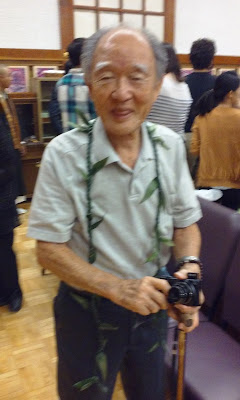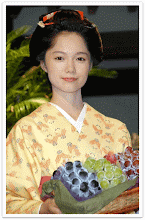This past weekend marked the 71st Anniversary of the dropping of the Atomic Bomb on Hiroshima. As done for the last 30 years, The Koyasan Buddhist Temple in Little Tokyo hosted the annual Commemorative Service in conjunction with the ASA (Atomic Survivors Association) and the JACCC. As per tradition, this years well attended service was held on the first Sunday in August to comemorate the twin tragedies and hear from guest speakers and our resident Hibakusha (Survivors). How fortunate they are still alive to speak with us.
Over the years we have come to know Ms. Kazu Suyeishi and were pleased to see she was more vibrant than in recent years past. She was 14 years old when the attack came and recalled how she could actually see the Enola Gay as it appeared in the crystal blue sky that morning of August 6th, 1945. Part of her story became an inspired component of our illustrated Children's book Ichiro Dreams in Color. Another poignant survivor who attends every year is former ASA President Mr. Junji Sarashina. Still alive and happy to see all who come to this ceremony. Both survivors now in their twilight years bear no grudge for the loss of their families or the scars they have borne. They come every year to speak on the horrors of nuclear weapons and share their annual message of Peace. Candles, Sutras, and Goeika are annually offered each year before the Hiroshima Flame that was originally brought here 40 some years ago from Hiroshima with the intention of remaining a lit until that last nuclear weapon is no more. While this may sound like a lofty and unrealistic aspiration, it's intention is a peaceful one to inspire hope for an age where there are no more wars of this sort and no more future Hibakusha. We do not know how many more years we have with Ms. Suyeishi or Mr. Sarashina, but we cherish each encounter with them and in one sense feel blessed by them. For people who have suffered so much at the hands of others, their faith in mankind and love of this country is one to be learned from. As stated by the guest speaker Dr. Dr. Gloria R. Montebruno Sadler PHD reminded us, "The Americans did not know at the time about the effects of radioactive fallout. No one could have envisioned what consequences would come of such a weapon at that time." Thus, it is perhaps President Truman who authorized the weapons use in Japan forbid General MacArthur from using it five years later in Korea. As we write about this let us reiterate one thing before anyone comments is that the debate over why the bomb was dropped is irrelevant. We look at this as a wartime tragedy that changed the world and luckily has not been repeated. That is the whole point of remembering those lost and those left to tell the tale. We at American Mishima have in the past and will continue to wish all those connected by this chapter in our human history continued peace and hope one day this one solemn flame can be extinguished in peace for all mankind.





































